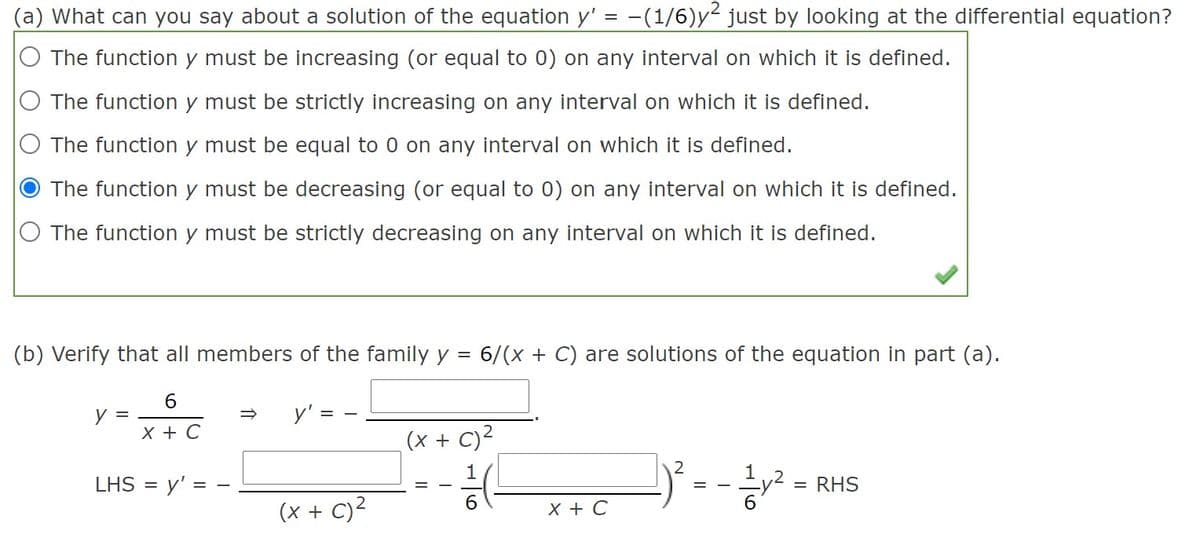(a) What can you say about a solution of the equation y' = -(1/6)y² just by looking at the differential equation? The function y must be increasing (or equal to 0) on any interval on which it is defined. O The function y must be strictly increasing on any interval on which it is defined. O The function y must be equal to 0 on any interval on which it is defined. O The function y must be decreasing (or equal to 0) on any interval on which it is defined. The function y must be strictly decreasing on any interval on which it is defined. (b) Verify that all members of the family y = 6/(x + C) are solutions of the equation in part (a). y' = - y = X + C (x + C)2 LHS = y' = - = RHS (x + C)2 X + C
(a) What can you say about a solution of the equation y' = -(1/6)y² just by looking at the differential equation? The function y must be increasing (or equal to 0) on any interval on which it is defined. O The function y must be strictly increasing on any interval on which it is defined. O The function y must be equal to 0 on any interval on which it is defined. O The function y must be decreasing (or equal to 0) on any interval on which it is defined. The function y must be strictly decreasing on any interval on which it is defined. (b) Verify that all members of the family y = 6/(x + C) are solutions of the equation in part (a). y' = - y = X + C (x + C)2 LHS = y' = - = RHS (x + C)2 X + C
Calculus: Early Transcendentals
8th Edition
ISBN:9781285741550
Author:James Stewart
Publisher:James Stewart
Chapter1: Functions And Models
Section: Chapter Questions
Problem 1RCC: (a) What is a function? What are its domain and range? (b) What is the graph of a function? (c) How...
Related questions
Question
Verify that all members of the family y = 6/(x + C) are solutions of the equation in part (a).
Need help with part (b) please

Transcribed Image Text:(a) What can you say about a solution of the equation y' = -(1/6)y just by looking at the differential equation?
The function y must be increasing (or equal to 0) on any interval on which it is defined.
The function y must be strictly increasing on any interval on which it is defined.
O The function y must be equal to 0 on any interval on which it is defined.
The function y must be decreasing (or equal to 0) on any interval on which it is defined.
O The function y must be strictly decreasing on any interval on which it is defined.
(b) Verify that all members of the family y = 6/(x + C) are solutions of the equation in part (a).
y =
y'
х+ С
(x + C)²
1
LHS =
y' =
= RHS
= -
6
(x + C)²
X + C
Expert Solution
This question has been solved!
Explore an expertly crafted, step-by-step solution for a thorough understanding of key concepts.
This is a popular solution!
Trending now
This is a popular solution!
Step by step
Solved in 2 steps with 2 images

Recommended textbooks for you

Calculus: Early Transcendentals
Calculus
ISBN:
9781285741550
Author:
James Stewart
Publisher:
Cengage Learning

Thomas' Calculus (14th Edition)
Calculus
ISBN:
9780134438986
Author:
Joel R. Hass, Christopher E. Heil, Maurice D. Weir
Publisher:
PEARSON

Calculus: Early Transcendentals (3rd Edition)
Calculus
ISBN:
9780134763644
Author:
William L. Briggs, Lyle Cochran, Bernard Gillett, Eric Schulz
Publisher:
PEARSON

Calculus: Early Transcendentals
Calculus
ISBN:
9781285741550
Author:
James Stewart
Publisher:
Cengage Learning

Thomas' Calculus (14th Edition)
Calculus
ISBN:
9780134438986
Author:
Joel R. Hass, Christopher E. Heil, Maurice D. Weir
Publisher:
PEARSON

Calculus: Early Transcendentals (3rd Edition)
Calculus
ISBN:
9780134763644
Author:
William L. Briggs, Lyle Cochran, Bernard Gillett, Eric Schulz
Publisher:
PEARSON

Calculus: Early Transcendentals
Calculus
ISBN:
9781319050740
Author:
Jon Rogawski, Colin Adams, Robert Franzosa
Publisher:
W. H. Freeman


Calculus: Early Transcendental Functions
Calculus
ISBN:
9781337552516
Author:
Ron Larson, Bruce H. Edwards
Publisher:
Cengage Learning